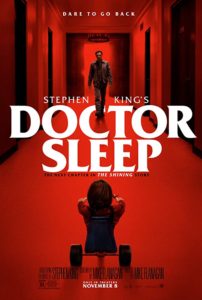 “What do you mean, they’re trying to make a sequel to The Shining?” is what I thought when I first heard about Doctor Sleep. Not that I am a huge fan of the original, though it’s certainly a classic and I enjoy it. But, when I saw Mike Flanagan (The Haunting of Hill House) was on the case, I became more optimistic. I’ll go ahead and mention that one potential drawback to this film is its dependence on The Shining. If you have not seen that film, I would not recommend Doctor Sleep, just because I think you will get so much more out of it in the proper context.
“What do you mean, they’re trying to make a sequel to The Shining?” is what I thought when I first heard about Doctor Sleep. Not that I am a huge fan of the original, though it’s certainly a classic and I enjoy it. But, when I saw Mike Flanagan (The Haunting of Hill House) was on the case, I became more optimistic. I’ll go ahead and mention that one potential drawback to this film is its dependence on The Shining. If you have not seen that film, I would not recommend Doctor Sleep, just because I think you will get so much more out of it in the proper context.
Full spoilers for The Shining and vague spoilers for Doctor Sleep will follow.
The Shining follows the Torrance family as Jack the father, played by the perpetually frightening Jack Nicholson, takes on the role of caretaker for the haunted Overlook Hotel during the winter season. His son, Dan, begins manifesting psychic powers that the ghostly tennants take interest in. Spooky activities ensue and Jack attempts to kill his family with an axe after falling under the influence of the hotel. Jack dies and his wife and son escape.
Doctor Sleep picks up about 35 years after The Shining and follows Dan Torrance, played by Ewan McGregor, as he struggles to come to terms with the traumatic experiences of his youth and present. At the start of the film, we see Dan continues to be visited by specters both from the Overlook Hotel and the people whom are comes in contact with. It being a Stephen King story, Dan is self-medicating via alcohol and generally trying to avoid using his psychic powers as much as possible. But, when Dan makes himself a real friend, gets into AA, comes across a young girl with powers much like his, and learns of people who eat those with “shining” abilities, he must finally come to terms with his past.
From a filmmaking level, this is a solid movie. The cast all gives great performances; particularly Rebecca Ferguson as the main antagonist Rose, the leader of a vampire cult that feeds on those who “shine”. This is a more methodical film than one might expect, things don’t really get moving plot-wise until maybe an hour in. But this allows for time to develop and process the characters, and we get time to see how Dan continues to be haunted by his past. The vampire “True Knot” cult is given a lot of attention, giving us a chance to see their perspective.
I’m not usually a fan of spooky/gory media. Films like Halloween or Friday the 13th have little appeal to me. But here’s the thing about horror movies: they can use the supernatural to talk about “the natural.” We often think about horror as a loud noise, followed by a scary face. That isn’t the appeal to me. A horror movie can talk about pretty intense things, such as trauma, grief and isolation. These are not fun things to sit with, but they are most definitely real. Trauma is inherently a violation of what’s “natural.” I think using ghosts to personify the wounds that characters bear can lead to some very powerful storytelling when done well.
Our main character is burdened by an ability that has only lead to tremendous pain in the past. Eventually, he learns to use his ability to commune with the dead to comfort people who are dying in hospice. I think a tendency people have is to want to reach out to those who struggle in ways similar to themselves. But we can often find ourselves getting hurt when the pain of others reawakens our own. This is similar to what Dan deals with in the movie when he’s forced to relive and confront the traumatic experiences that haunt him from the Overlook hotel. Dan does not emerge from this movie unscathed; there are wounds that we are going to carry for our whole lives.
The film conveys a complex take on trauma, not denying how it can influence and maybe even help us care for others, while acknowledging that being “wounded” is still something that must be painfully managed. Being hurt is an inevitable part of life, we can recognize and resist that, or try to escape. These responses to trauma are explored in a juxtaposition between how Dan and Rose deal with death. Dan uses his powers to gently soothe hospice patients as they pass on. Rose more or less belittles one of her cult members as he dies, declaring that all of the fear he sewed in life will live on, so death shouldn’t scare him.
The “True Knot” cult is all about protecting themselves from death, and they do that by inflicting trauma on others. Whereas Dan cannot escape his past even when he tries to forget, it’s only by facing his wounds with the support of a friend that he is able to heal. This is what allows him to sit with others during their most fearful moment, finally discovering a positive use for his powers. Despite still carrying the pain from his youth, he is now able to show caring empathy for those in similar circumstances. Trauma recovery is difficult, unenviable and sometimes lifelong, but it’s easier when you aren’t alone.
